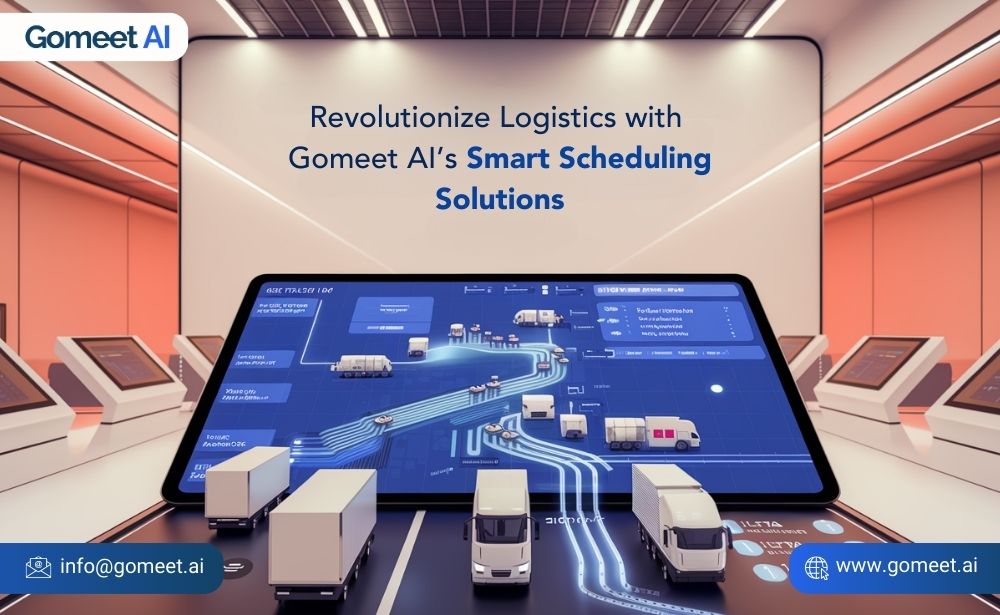In the world of logistics, we all know, effective scheduling is crucial. However, the process of coordinating schedules among multiple suppliers and clients is often plagued by inefficiencies, miscommunication, and unexpected delays. According to a recent report by Capgemini, over 60% of logistics professionals say that poor scheduling directly contributes to costly delays and resource misallocation. In a field where timing and coordination are everything, traditional scheduling methods are simply not up to the task.
Enter AI scheduling. Leveraging artificial intelligence for scheduling in logistics introduces automation, real-time coordination, and advanced communication capabilities. Unlike traditional tools, AI scheduling adapts dynamically to changes in demand, availability, and resources, making it a game-changer for logistics companies worldwide. As we move into 2025, AI-driven scheduling is increasingly recognized as the future of logistics, helping companies enhance productivity, improve supplier and client relationships, and cut down on operational costs.
Section 1: Current Challenges in Logistics Scheduling
Why Traditional Scheduling Falls Short in Logistics
The logistics industry faces unique challenges when it comes to scheduling. The sheer volume of suppliers, clients, and shipments requires intricate coordination. Unfortunately, traditional scheduling methods struggle to keep up, leading to inefficiencies and escalating costs.
- Supplier Coordination: Logistics companies often work with a vast network of suppliers. Each supplier may have different availability, response times, and schedules. Managing all these variables manually can result in inconsistencies and delays, affecting the entire supply chain.
- Client Demand: Clients, particularly in fast-moving industries, often require last-minute changes. Traditional scheduling systems lack the agility to adapt to these sudden shifts, disrupting previously planned schedules and slowing down response times.
- Resource Allocation: Efficiently allocating vehicles, personnel, and resources to meet supplier and client needs is a balancing act. With traditional tools, it’s challenging to ensure that resources are optimally deployed, which often leads to overuse or underuse of assets and increased costs.
Section 2: How AI Scheduling Transforms Logistics
AI Scheduling: The Game-Changer for Logistics
AI scheduling was specifically developed to tackle these challenges in logistics. By employing AI meeting schedulers and AI scheduling software, logistics companies can automate coordination, real-time updates, and even predictive adjustments. Here’s how AI scheduling stands out:
- Real-Time Coordination: One of the greatest advantages of AI scheduling is its ability to adjust in real-time. For instance, if a supplier reports a delay, the AI can instantly recalibrate schedules, notify all relevant parties, and reallocate resources. This ensures that logistics companies can respond quickly to disruptions without manual intervention.
- Automated Updates and Notifications: Communication is essential in logistics. AI scheduling tools automatically send updates to clients and suppliers regarding schedule changes, ensuring that everyone is aligned. According to a study by McKinsey, automated notifications reduce response times by up to 40%, improving overall operational efficiency.
- Predictive Resource Management: Using historical data and machine learning, AI scheduling software can predict resource needs for upcoming schedules. This means logistics companies can proactively allocate vehicles, personnel, and other assets, avoiding bottlenecks and inefficiencies.
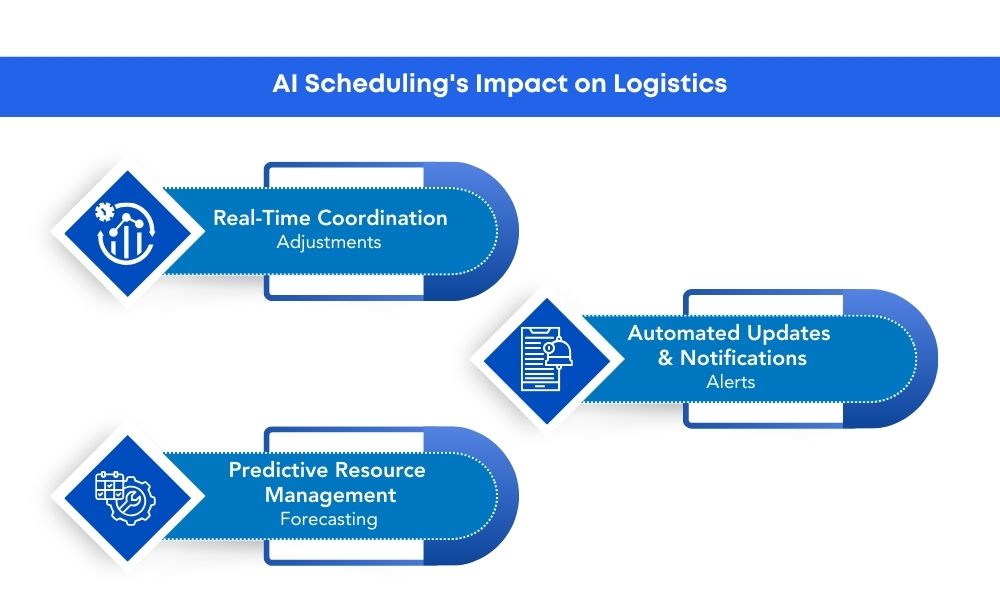
Section 3: Key Features of AI Scheduling Software for Logistics
Must-Have Features in AI Scheduling Software for Logistics
When choosing the right AI scheduling software, logistics companies should look for specific features that address their industry’s needs. These include:
- AI Meeting Scheduler: Enables real-time coordination with suppliers and clients, making it easier to align schedules even in a fast-paced environment. By automating the scheduling process, logistics companies can save valuable time and focus on other critical tasks.
- Sales Lead Automation: Integrating AI scheduling with sales processes ensures that schedules align seamlessly with sales goals. Sales lead automation allows logistics teams to respond quickly to new business opportunities, ensuring that potential leads aren’t lost due to scheduling conflicts.
- Automated Rescheduling: As changes arise, AI scheduling software can dynamically adjust schedules to accommodate real-time updates. Automated rescheduling reduces the burden on human managers, allowing them to manage other aspects of logistics operations.
- Data Integration: For a holistic view of logistics, AI scheduling software should integrate with CRM, ERP, and other logistics tools. This allows companies to manage scheduling within the context of other operational data, leading to smarter, data-driven decisions.
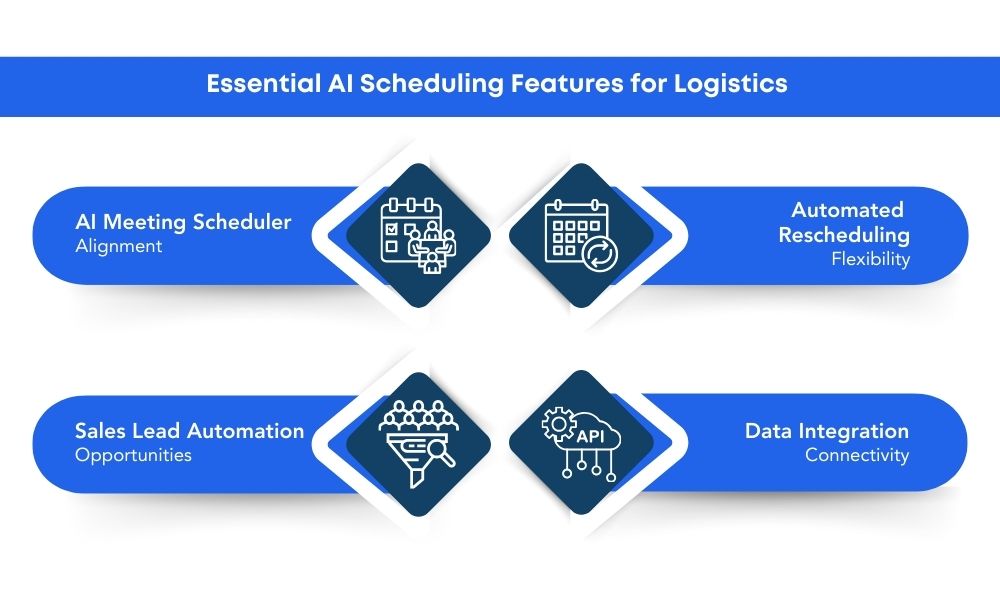
Section 4: Benefits of AI Scheduling in Logistics
Why AI Scheduling Simplifies Supplier and Client Coordination
Implementing AI scheduling in logistics offers numerous advantages that go beyond mere convenience. Here are some of the primary benefits:
- Enhanced Efficiency: AI scheduling reduces the need for manual scheduling tasks, freeing up logistics managers to focus on strategic decision-making. According to Deloitte, companies using AI scheduling report an average of 30% improvement in operational efficiency.
- Improved Accuracy: Traditional scheduling is prone to errors. With AI, these errors are minimized, leading to more reliable and consistent schedules. This translates to fewer missed shipments, delayed deliveries, and customer complaints.
- Cost Savings: By reducing delays and optimizing resource use, AI scheduling contributes directly to a company’s bottom line. Efficient scheduling reduces operational costs associated with fuel, personnel, and time, maximizing the profitability of each shipment.
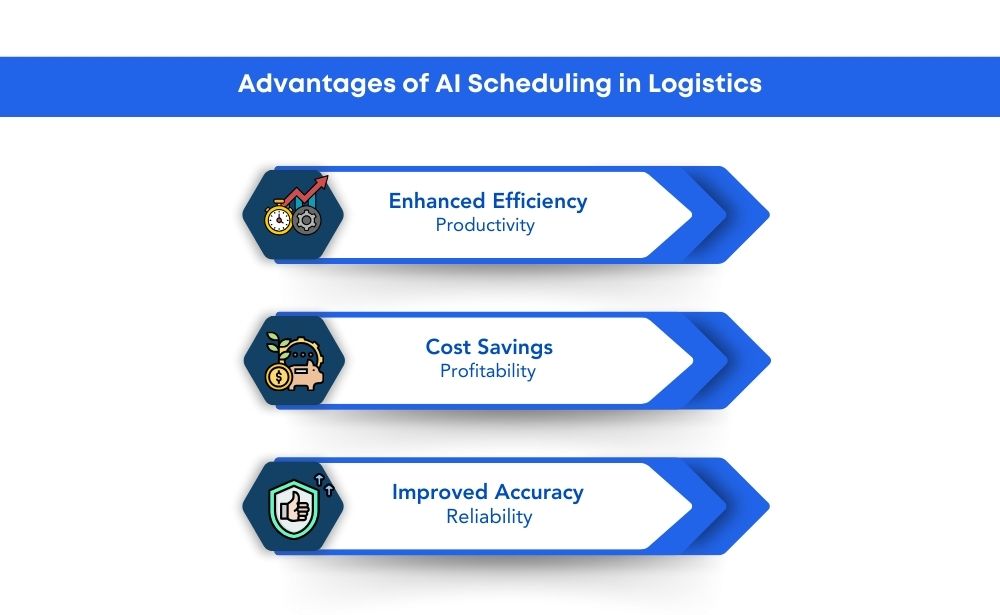
Section 5: Real-World Examples of AI Scheduling in Logistics
How Companies are Using AI Scheduling to Optimize Logistics
Many logistics companies are already reaping the benefits of AI scheduling software. Here are some real-world examples:
- Example 1: A large freight company implemented an AI meeting scheduler to streamline client and supplier coordination. By automating updates and re-allocating resources in real-time, the company reduced wait times by 30%, significantly improving turnaround times.
- Example 2: A logistics firm integrated AI scheduling software with their CRM, aligning logistics schedules with their sales targets. This alignment led to faster deliveries, which boosted client satisfaction rates by 25% and helped the company maintain a competitive edge.
- Example 3: A major retail distributor adopted sales lead automation within their scheduling process to predict client demand. This proactive approach helped reduce warehouse overflow by 20%, ensuring that resources were allocated more effectively and costs were minimized.
Section 6: Future Trends in AI Scheduling for Logistics
What’s Next? The Future of AI Scheduling in Logistics
As technology evolves, AI scheduling software will continue to advance, bringing even more value to the logistics sector. Here are some upcoming trends to watch:
- Enhanced Predictive Capabilities: AI will become even better at predicting demand and adjusting schedules accordingly. This will help logistics companies stay ahead of client needs and reduce last-minute changes that disrupt operations.
- Integration with IoT and Sensors: By integrating with IoT devices, AI scheduling will manage assets like trucks and shipments in real-time. Data from sensors can alert the AI to issues, such as traffic delays, and adjust schedules accordingly.
- Automated Contract Management: Smart contracts will handle supplier agreements and scheduling automatically, reducing administrative tasks and ensuring that all parties adhere to agreed-upon timelines and conditions.
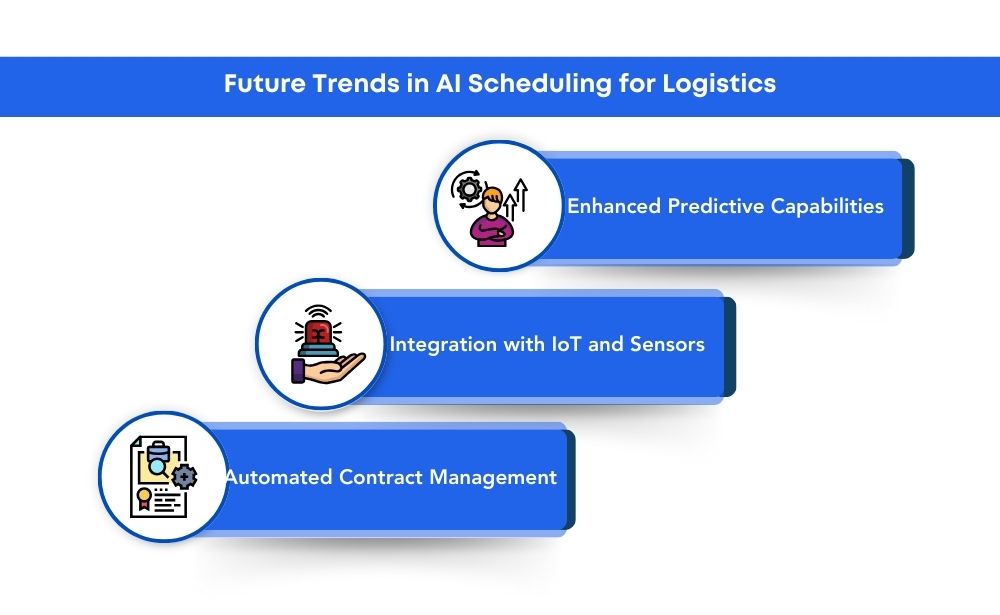
Conclusion
The adoption of Gomeet AI’s scheduling technology in logistics is more than just a trend; it’s a transformative shift that promises to redefine how the industry operates. By addressing the limitations of traditional scheduling methods, Gomeet AI’s advanced scheduling software enables logistics companies to coordinate seamlessly with suppliers and clients, minimize errors, and maximize operational efficiency.
For logistics companies looking to stay ahead, Gomeet AI’s AI-driven meeting schedulers and automated scheduling software offer the keys to unlocking unprecedented levels of productivity and enhanced customer satisfaction. As we look towards 2025, embracing Gomeet AI’s technology empowers logistics firms to streamline their operations, improve client interactions, and ultimately, accelerate growth.
Ready to revolutionize your logistics operations? Explore Gomeet AI’s powerful scheduling solutions today and experience the future of efficient, automated logistics coordination firsthand.

